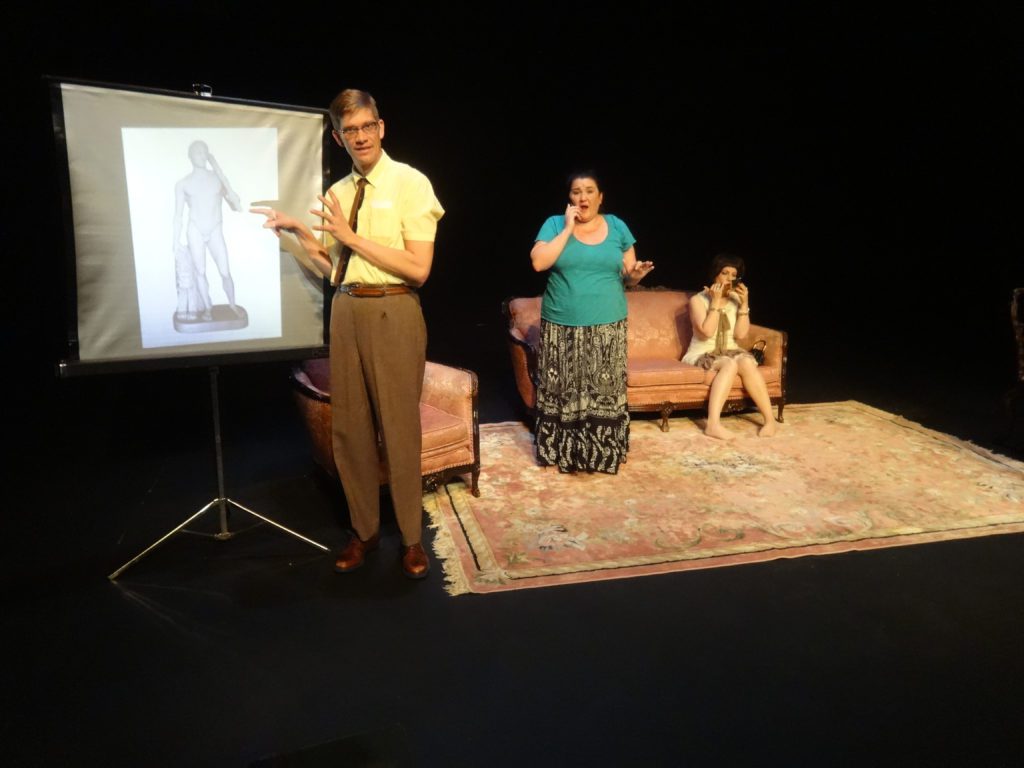When the members of Buntport Theater Company are at the top of their form, wonderful things happen. And with Naughty Bits, they’re at their peak both in terms of performance and — since this company creates all its plays collaboratively — in terms of the humor, flow and inventiveness of the script, which happens to focus on a missing member.
Naughty Bits tells three related stories, all surrounding the figure of the famous Landsdowne Hercules, or Heracles, a Roman statue of the mythic hero holding a club over his left shoulder and the skin of the Nemean Lion he killed as his first great labor in his right hand. The statue was restored in the eighteenth century — except for its broken-off penis. In one of the three stories, set in the 1920s, an inconceivably wealthy fellow called Harry conducts an extended flirtation with his witty and seductive mistress, Jenny. She’s teasingly scornful of the Hercules statue — which he’s purchased — and all the other great artworks on his English estate, also recently purchased. Then there’s the 1950s Art Historian, insanely passionate about his work, fumbling with his slides and projector as he expatiates on the wonders of the statue, its missing part and his thoughts about art in general to us, the audience. The contemporary Romance Novelist, meanwhile, having done some research into the Landsdowne Hercules, is pitching a book proposal to her editor. She wants to put the statue in the home of one Lady Louisa, who will fall in love with it, missing genitalia and all. As she munches on hot dogs and spins her torrid, silly, soulful plot, the Novelist’s relationship with the distant male editor is revealed as more and more complicated.
The three segments may be separate, with each protagonist in his or her own reality, but they gradually come together over the course of the evening, and the last line of dialogue in almost every scene leads suggestively into the next, until the ideas meld together to form a kind of whole, a meditation on love, sex, art, history, power, money and gender that ends with a fleshy (sort of), outrageous and snortingly funny climax. Naughty Bits illustrates the way a work of art travels through time, changing both physically and in the way it’s interpreted, taking on different colorations and significances in different eras and in individual imaginations. This Hercules is a paradox — a hero, a love god, the epitome of male beauty — but lacking the essential male appendage. So he represents — at least to the Novelist — both male and female or neither, a kind of coming together in peace and mutual understanding.
Naughty Bits also plays with the assumed gulf between high and low art. Of course a connoisseur’s interest in a naked statue has a touch of low prurience, and this is certainly true of the Art Historian, who both thrills to the statue’s aesthetics and is rendered inarticulate by his distress and excitement at the whole genital issue. Meanwhile the Romance Novelist, while conceding her usual work is smut, is clearly reaching for something new here; she’s in the puzzled, open and exploratory state of anyone absorbed in genuine artistic creation. Buntport has illustrated this dichotomy in previous work, demystifying high art and taking down artistic pretension while still treating great works with profound respect. In Tommy Lee Jones Goes to Opera Alone, for example, a waitress beefs up the plot for La Boheme and sings happily along with the arias. (Tommy Lee Jones will return in January.)
Erin Rollman’s Jenny is a comic masterpiece, elegantly slutty, a parody of a 1920s movie siren. Brian Colonna is crazy funny as her suave lover, Harry. Erik Edborg has made a practice of creating outlandish characters and inhabiting them so fully that you absolutely believe in them, and he does it here with the deliciously mannered Art Historian. The inimitable Hannah Duggan brings all kinds of passionate, angry, vulnerable conviction to the Romance Novelist, along with a strong dash of feminist rage.
But Naughty Bits is anything but dense or polemical. It’s a dazzling, skillfully structured, swift-moving and original comedy, filled with insane imaginings, daring bits and hilarious bons mots. And when those deeper currents surface, they sparkle and flash, too.
-Juliet Wittman, September 24, 2014, Westword
